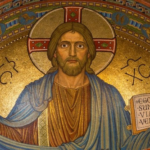We run our website the way we wished the whole internet worked: we provide high quality original content with no ads. We are funded solely by your direct support. Please consider supporting this project.

Jesus: Our Vision of God
At the beginning of his Gospel John taught that “no one has ever seen God, but the one and only Son, who is himself God and is in closest relationship with the Father, has made him known” (Jn 1:18). He is claiming that, outside of Christ, no one has ever truly known God.
In the preceding verse John contrasted the “grace and truth” that “came through Jesus Christ with “the law” that “was given through Moses” (Jn. 1:17). Taken together, these two verses suggest that people didn’t really know the truth about God through the law. The truth about God was disclosed only when God’s grace was revealed through the one and only Son, who is himself God.
Jesus is consistently presented as the only one who truly knows the Father and the only one through whom people can come to know the Father (Jn 17:3). Jesus is “the way and the truth and the life,” and “no one comes to the Father except through [him]” (Jn 14:6). The definite article before “way,” “truth” and “life” precludes any other ways to God, any other truths about God, and any other means of receiving life from God.
In this same passage Jesus immediately goes on to say, “If you really know me, you will know my Father was well. From now on, you do know him and have seen him” (Jn 14:7). Jesus was of course referring to himself as the personal revelation of the Father. His disciple Philip missed the point, however, for he went on to ask Jesus to “show us the Father” (14:8), to which Jesus makes the astonishing reply: “Don’t you know me, Philip…? Anyone who has seen me has seen the Father. How can you say, ‘Show us the Father’” (14:9)? Jesus was emphasizing the point that, if we want to know who the Father truly is—if we want to “see” him—we must not look to anyone other Jesus.
So close is the connection between the Father and the Son in the theology of John that anyone who knows the Son thereby knows the Father, while anyone who denies the Son thereby denies the Father as well (I Jn. 2:22-23). We cannot theoretically separate knowledge of the Father from our knowledge of the Son. So too, whoever honors the Son thereby honors the Father while whoever does not honor the Son does not honor the Father (Jn 5:23).
This intensely Christocentric focus is summed up in John’s teaching that Jesus is the eternal Word of God (Jn. 1:1). There has been much scholarly debate about what exactly the Greek term for “Word” (logos) entails, however, it at least entails that Jesus is God’s self-communication. The definite article is once again all-important. It is not that there are many “words” of God: there is one, and it is Jesus. As Poythress notes, John’s identification of Jesus as “the Word” implies that “all particular divine words, from the words of creation onward, are manifestations of the one eternal Word.”[1] If any words reveal God, therefore, it is only to the extent that they participate in and agree with God’s one and only Word, Jesus.
Similarly, John repeatedly describes Jesus as God’s light in the world (John 8:12). It’s not that there are many “lights” of God in the world: there is one, and it is Jesus. If anyone’s words shed light on who God truly is, therefore, it’s only to the extent that they participate in and agree with God’s one and only light, Jesus.
[1] Poythress, God Centered, 58.
Photo Credit: Riley McCullough via Unsplash
Category: General
Tags: Father, God, God's Character, Jesus, Word of God
Topics: Christology
Related Reading

Following Jesus from the Margins
D. Sharon Pruitt via Compfight Kurt Willems posted a reflection today entitled From the Margins: Following Jesus in a post-Christian culture. I hope everyone will read this. It’s a perspective from the anabaptist tradition that finds inspiration from the same data that evangelicalism finds alarming. May we all follow Jesus from the margins and offer…

Jesus is the Center of the Story
The previous post addressed how the revelation of Christ is the surprising twist that reframes how we must read all that precedes it. Today we’ll look briefly at five supports to this claim. Jesus said, “I have a testimony greater than that of John” (John 5:36). Jesus elsewhere claims that “among those born of women…

Imaging God Rightly: God’s Self-Portrait, Part 3
In the previous two blogs I noted that the vision of God in our minds is the single most important vision in our lives, for it completely determines whether we’ll have a relationship with God and what kind of relationship this will be. A. W. Tozer once wrote, “What comes into our minds when we…

Forgiveness in the Christus Victor View of the Atonement
Did Jesus need to die on the cross to satisfy God’s wrath in order for us to be forgiven? Greg discusses the role of forgiveness in the Christus Victor view of the Atonement.

God’s Dream for the World
The future doesn’t yet exist—which is why it’s future instead of the present or past—this doesn’t mean I’m claiming the future is wide open. To the contrary, it’s very clear from Scripture that God has a great plan for the future, and this plan steers the course of history by setting limits on what can…

Drum Roll Please: Greg’s Final Critique of Bart Ehrman’s Article
This is the ninth and final of several videos Greg put together to refute Bart Ehrman’s claims published in the article What Do We Really Know About Jesus? Thanks for hanging in there for this last one. I know it was a long wait, but the holidays got inordinately busy for Greg. In this segment, Greg talks…
